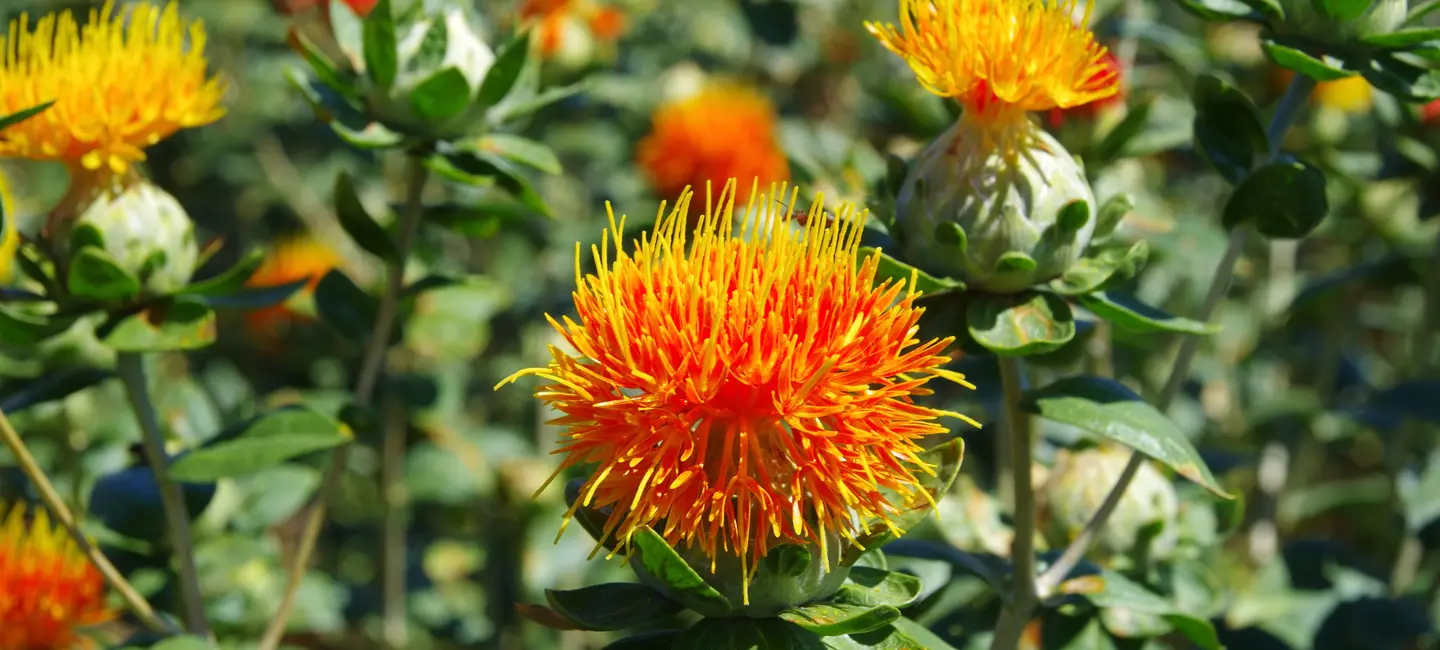
Safflower (Carthamus tinctorius) is a plant that grows throughout the world. Its seed oil is a rich source of the essential fatty acid, linoleic acid.
The linoleic acid in safflower oil might help reduce the risk of heart disease. Safflower also contains chemicals that might help prevent blood clots, widen blood vessels, lower blood pressure, and stimulate the heart.
People use safflower oil for high cholesterol, heart disease, stroke, diabetes, and many other conditions, but there is no good scientific evidence to support most of these uses.
Is It Effective?
NatMed Pro rates effectiveness based on scientific evidence according to the following scale: Effective, Likely Effective, Possibly Effective, Possibly Ineffective, Likely Ineffective, Ineffective, and Insufficient Evidence to Rate.
- High cholesterol. Using safflower oil in place of other oils in the diet might help lower total and low-density lipoprotein (LDL or "bad") cholesterol in people with and without high cholesterol.
There is interest in using safflower for a number of other purposes, but there isn't enough reliable information to say whether it might be helpful.
Is it Safe?
When taken by mouth: Safflower oil is likely safe to use as part of the diet. It's usually well-tolerated.
When applied to the skin: Safflower oil is possibly safe when used for up to 8 weeks.
Special Precautions & Warnings:
Pregnancy: Safflower oil is likely safe to use as part of the diet. Safflower flower is likely unsafe when used during pregnancy. It has effects that may lead to a miscarriage.
Breast-feeding: Safflower oil is likely safe to use as part of the diet. There isn't enough reliable information to know if safflower flower is safe to use when breast-feeding. Stay on the safe side and avoid use.
Children: Safflower oil is possibly safe when taken by mouth in children for up to 8 weeks. There isn't enough reliable information to know if safflower flower is safe for children.
Bleeding problems (hemorrhagic diseases, stomach or intestinal ulcers, or clotting disorders): Safflower can slow blood clotting and might increase the risk of bleeding in people with bleeding disorders.
Allergy to ragweed and related plants: Safflower may cause an allergic reaction in people who are sensitive to the Asteraceae/Compositae family. Members of this family include ragweed, chrysanthemums, marigolds, daisies, and many others.
Diabetes: Safflower oil might increase blood sugar. This might make it harder to control blood sugar levels in people with diabetes.
Surgery: Safflower oil might slow blood clotting. This might increase the risk of bleeding during and after surgery. Stop using safflower oil at least 2 weeks before a scheduled surgery.
Medications for diabetes (Antidiabetes drugs)
Interaction Rating=Moderate Be cautious with this combination.
Safflower oil might increase blood sugar levels. Taking safflower oil along with diabetes medications might reduce the effects of these medications. Monitor your blood sugar closely.
Medications that slow blood clotting (Anticoagulant / Antiplatelet drugs)
Interaction Rating=Moderate Be cautious with this combination.
Safflower oil might slow blood clotting. Taking safflower oil along with medications that also slow blood clotting might increase the risk of bruising and bleeding.
Warfarin
Interaction Rating=Moderate Be cautious with this combination.
Warfarin is used to slow blood clotting. Safflower oil might increase the effects of warfarin. Increasing the effects of warfarin might increase the risk of bruising and bleeding. Be sure to have your blood checked regularly. The dose of your warfarin might need to be changed.
Herbs and supplements that might lower blood sugar: Safflower oil might increase blood sugar. Taking it with supplements that lower blood sugar might reduce the effects of these products. Examples of supplements that lower blood sugar include aloe, bitter melon, cassia cinnamon, chromium, and prickly pear cactus.
Herbs and supplements that might slow blood clotting: Safflower oil might slow blood clotting and increase the risk of bleeding. Taking it with other supplements with similar effects might increase the risk of bleeding in some people. Examples of supplements with this effect include garlic, ginger, ginkgo, nattokinase, and Panax ginseng.
There are no known interactions with foods.
Safflower oil has most often been used by adults in doses of 20-30 mL by mouth daily for up to 8 weeks. Speak with a healthcare provider to find out what dose might be best for a specific condition.
Alazor, American Saffron, Bastard Saffron, Benibana, Benibana Oil, Benibana Flower, Cártamo, Carthame, Carthame des Teinturiers, Carthamus tinctorius, Chardon Panaché, Dyer's Saffron, Fake Saffron, False Saffron, High Oleic Acid Safflower Oil, Hing Hua, Honghua, Huile de Carthame, Kusumbha, Kusum Phool, Safflower Nut Oil, Safflower Oil, Safflower Seed Oil, Safflower Yellow, Safran Bâtard, Safranon, Zaffer, Zafran.
Information on this website is for informational use only and is not intended to replace professional medical advice, diagnosis, or treatment. While evidence-based, it is not guaranteed to be error-free and is not intended to meet any particular user’s needs or requirements or to cover all possible uses, safety concerns, interactions, outcomes, or adverse effects. Always check with your doctor or other medical professional before making healthcare decisions (including taking any medication) and do not delay or disregard seeking medical advice or treatment based on any information displayed on this website.
© TRC Healthcare 2024. All rights reserved. Use and/or distribution is permitted only pursuant to a valid license or other permission from TRC Healthcare.
